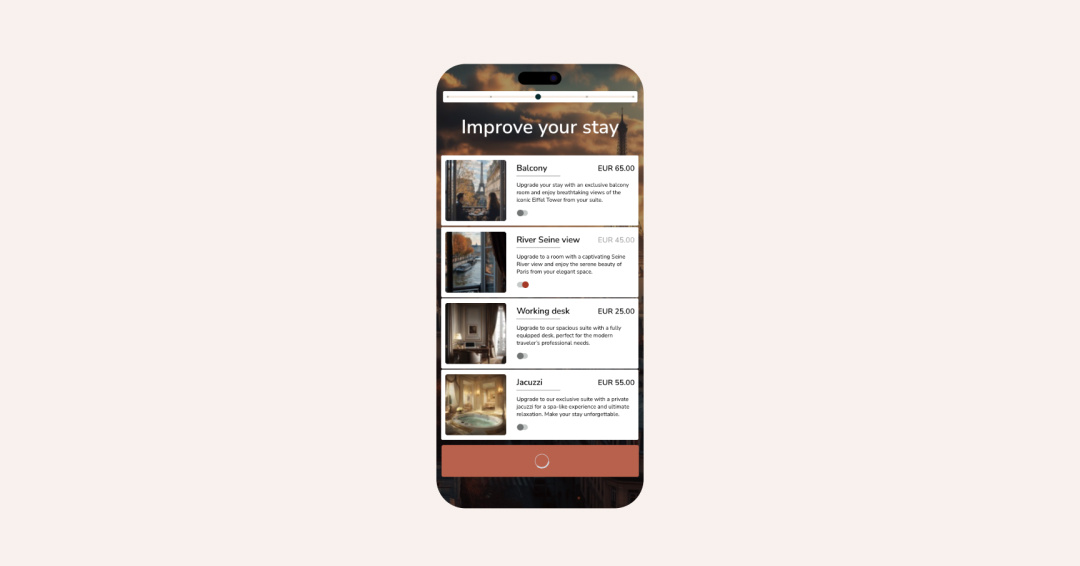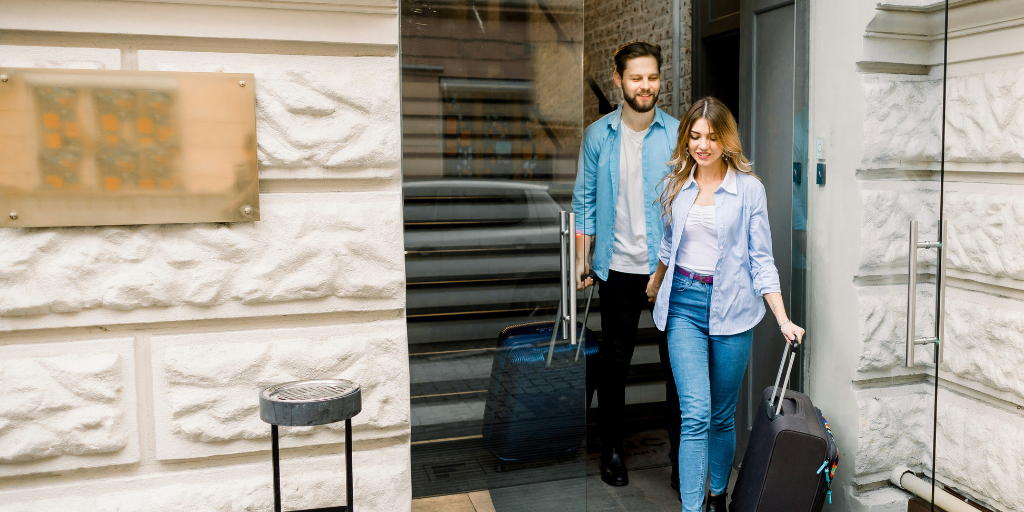When guests can select the specific room features they desire — like a stunning view, a welcoming balcony for their morning coffee, or a premium hair dryer to enhance their start of the day — you meet the guest’s unique preferences and boost your hotel’s revenue potential from the rooms you already have.
The advantages go beyond more revenue. This strategy personalises the guest experience and makes it unforgettable. Empowering guests to customise every aspect of their stay increases satisfaction, generates positive reviews, encourages repeat visits, and drives referrals.
Introducing Hybrid Attribute-Based Selling (HABS) by Clock, a new solution that allows guests to personalise their stay during the (online) check-in process. Clock is one of the first property management providers to integrate hybrid HABS as a core feature.
Read on to learn how it works and how your hotel can benefit from it.

Hybrid Attribute-Based Selling (HABS)
Pure attribute-based selling (ABS) allows guests to choose individual room features like views or proximity to amenities. However, unbundling all room attributes can simplify the number of room categories and highlight room attributes as a key form of differentiation and revenue upgrade. Many hotels may find it challenging to implement, as most third-party booking platforms like OTAs, GDS, and corporate platforms may not support this approach.
A hybrid attribute-based selling model improves upon this, balancing maintaining room categories while offering personalised upgrades. Clock’s industry-first hybrid model allows you to retain essential room types for different market segments while layering attribute-based customisation. This approach preserves room inventory clarity while allowing guests to personalise their experience based on preferences.
The result is a smoother adoption of the model and simplified operational workflow for your team and a more intuitive, satisfying experience for your guests, as they can upgrade from a standard room type without being overwhelmed by too many choices.
This unique hybrid model allows you to continue segmenting your market effectively while enjoying the additional revenue streams from personalised upselling. It perfectly combines structure and flexibility, maximising guest satisfaction and revenue potential.
Why HABS?
Implementing Hybrid ABS isn't just about adding a new service— the new strategy can substantially increase your RevPAR and simplify availability and inventory management while improving guest satisfaction.
Let's explore these advantages:
1. Increased Revenue per Available Room (RevPAR)
Let guests choose premium features with ABS to increase your average daily rate (ADR) and overall revenue per available room. It helps you capitalise on and guarantee the amenities that guests seek, previously only available on a limited basis.
2. Smart availability management
HABS lets you upsell confidently, assured that you can fulfil your promises with the available inventory.
3. Improved guest satisfaction
Guests have always wanted specific room attributes. Allowing them to customise their rooms to their preferences greatly enhances their satisfaction and overall experience.
4. Simplified inventory management
HABS simplifies the management of various room types by offering tailored room features without segmenting inventory into fixed categories. You can maintain fewer basic room types by unbundling room attributes while effectively upselling the desired features.
Real-life examples of HABS
Hybrid Attribute-Based Selling offers your hotel new opportunities to increase guest satisfaction and revenue.
Here are some practical ways hotels can leverage Clock's HABS:
- Tailored Room Features: Let guests personalise their rooms with specific features that match their preferences, such as varying bedding configurations or premium hair dryers.
- Location-Based Attributes: Allow guests to select rooms based on their desired location within the hotel, whether close to elevators or with balcony access and stunning views.
- Enhanced Room Amenities: Provide additional amenities that guests can add to their rooms, like yoga mats, working desks, high-speed internet, or gaming consoles.
- Flexible Housekeeping Services: Offer customisable housekeeping options, letting guests choose the cleaning frequency or eco-friendly alternatives.
By integrating Clock's Hybrid Attribute-Based Selling during the online check-in process, hotels can significantly enhance the guest experience while driving higher revenue and fostering guest loyalty. This innovative approach highlights a hotel’s dedication to customer-centric service.
What attributes can you sell?
During the online check-in process, guests can select from a range of optional features to personalise their stay, each available for an additional fee.
Features you can sell include:
- Eiffel Tower view: €15
- Twin bed: Free
- Balcony: €45
- A desk: €25
The system updates in real-time to display only currently available options, ensuring that each guest receives exactly what they have selected. This approach prevents overbooking and enhances the guest experience by delivering their chosen attributes.
Guests can select and pay for multiple attributes, such as a room with a balcony and a river view. The system ensures that chosen attributes are compatible and available for a smooth booking experience.
Summary
Clock's Hybrid Attribute-Based Selling (HABS) offers a new way for hotels to increase revenue while enhancing the guest experience. Unlike traditional ABS, which can overcomplicate room categories by unbundling all features, Clock’s hybrid approach retains core room types while offering personalised upgrades.
This approach lets guests select specific room features, like a balcony or a premium view, during the online check-in, boosting revenue without overwhelming them with choices. It simplifies inventory management and makes it easier for hotels to implement, as it integrates with existing systems. By balancing structure and personalisation, hotels can increase RevPAR, streamline operations, and improve guest satisfaction.






